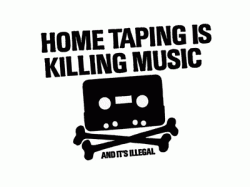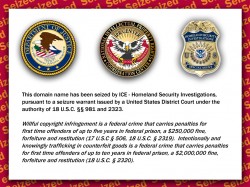Weekly News Roundup (11 December 2011)
Welcome to, by my calculations, the third last WNR of 2011. “You’ve got to be joking”, was a phrase that went through my mind quite a few times this week, while reading and writing some of the news items you’ll read about below. What they say is true, real news is becoming more and more like Onion News these days, which is both funny and incredibly depressing all at the same time.

Let’s not waste more of 2011, and let’s started with this week’s copyright rants. We start with a scary peak into the future, if the likes of SOPA and PIPA are made into law, with the story of website that was seized as part of last year’s “Cyber Monday” seizures by the Department of Homeland Security.
I’ll leave you to read the full story for all the details, but suffice to say, domain was seized on the instance of music industry executives, website owner argues fair use, government, probably knowing that they didn’t have justification to make the seizure in the first place, stalls, and a full year later, domain name is returned to owners. Website ruined, financial costs incurred, and all for nothing.
The website in question was DaJaz1.com, who offered leaked music for downloads. The record labels told the government to seize the website, but the owners of DaJaz1.com says that the songs they linked to (not hosted) were often provided to them by employees of the record labels, for promotional purposes. But you have government agents too stupid to realise they’ve become pawns of the record (and movie) industry, too lazy to do any real research on the list of “bad” websites handed to them, and a justice system too biased towards rights holders. The full financial cost to DaJaz1.com is incalculable, and for most websites, being offline for a whole year basically means the end.
I do have my little theory about why the RIAA wanted DaJaz1.com shut down, as they also took down a few similar websites during the same operation. At its heart, the job of the RIAA companies is to help promote artists. But these days, the Internet can be leveraged by artists themselves for promotional purposes, and even music distribution, once relying on manufacturing/distribution/retail chain, can be all done digitally these days. In other words, there’s little justification these days for studios to be taking as much from artists as they are, and for all the talk of web piracy, this is what scares the RIAA companies the most. So any website that helps artists to directly promote their work, generate hype by using leaked music, and thus bypassing the studio system, will be seen as a major threat. Maybe not today, but soon enough. And PIPA/SOPA will then allow the record companies to get their dirty hands around the Internet, close down websites that threatens their outdated business model.
But even if the mistake was just an innocent one, how many websites will have to become collateral damage in this un-winnable war against downloads, before a real innovative website, like the next YouTube, will be the ultimate victim (it if hasn’t already occurred). The rights holders keep on saying that websites like YouTube getting blocked is hyperbole, and they may be right at present, because nobody is going to shut down YouTube without facing a mighty smashing courtesy of Google’s legal hammer, but would YouTube have been so safe in its infancy had SOPA/PIPA existed then? People uploading copyrighted clips was what the early days of YouTube was all about, before people realised they could create their own videos and it would be even more popular than a re-upload of something people can get on BitTorrent anyway. While it is now the bastion of creativity, it once was a haven for pirates (at least according to Viacom, in their lawsuit against YouTube), and it might just fall into the “dedicated to piracy” category of SOPA/PIPA. And if YouTube had been destroyed back then, would the web, and creativity and innovation, and the economy, be better off, or much much worse off? Is this a risk we should be taking?
It seems many are finally realising that, SOPA/PIPA, is very very dangerous. And it was a pleasure to read the quotes attributed to the CEO of the Consumer Electronics Association, Gary Shapiro. Not only does the CEA produce the excellent CES exhibition, and represents all the major electronic manufacturers, it appears they’ve joined the anti-SOPA brigade as well. Shapiro used language that even I might be a bit scared to used in the WNR, for fear of appearing too biased, but he’s absolutely right that SOPA will kill “innovation, wealth and jobs”, and that SOPA is nothing more than “a bunch of Hollywood and music industry lobbyists destroying the Internet”. Couldn’t have put it better myself (really, I couldn’t). I wonder if Sony, the only company to actually both belong to the pro-SOPA RIAA, and anti-SOPA CEA, might reconsider their CEA membership, although Shapiro did mention quite clearly that his views had wide ranging support amongst CEA members.
Other trade groups, some staunch supporters of SOPA, are also now reconsidering their support following the public backlash. The BSA, the anti-piracy lobby group for software makers, has in recent days, softened their support for SOPA, basically calling it overreaching. No doubt after many of their members complained about the group’s position of a bill aimed directly at tech companies, and one which ultimately only benefits the music and movie industries. But if the BSA continues to even partially support SOPA, then other companies could join Kaspersky in withdrawing from the group in protest over SOPA. The threat to Internet security posed by SOPA is well known, but it’s nice seeing a security company take a significant step in their protest of SOPA and the damage it could unleash on the Internet.
The MPAA has launched a stern defence of SOPA, by first attacking an alternate, less controversial bill as being too friendly to dirty old web pirates. As the MPAA was most likely the people who actually came up with SOPA, it’s no surprise they aren’t accommodating to any alternatives. But the MPAA’s Chairman, Chris Dodd, also added fuel to the fire with a couple of curious comments. First up, he question why Google is not accommodating when it comes to filtering search results, by saying “When the Chinese told Google that they had to block sites or they couldn’t do [business] in their country, they managed to figure out how to block sites.”
That comment is simply too stupid to even come up with a reply, it would just be too easy to point out everything that’s wrong with the statement (and at the same time, it’s hard to resist point out the fact that Google pulled out of China for being forced to censor results, are we really comparing the US to China when it comes to web censorship, of all issues). To be fair to Dodd, he was probably referring to the technical aspects of result filtering, but it’s one thing to filter the BBC or CNN, but it’s another when you have to filter the thousands upon thousands of website the MPAA deems “bad”, as well as pre-emptively blocking “red flag” sites.
But Dodd wasn’t finished, because he had an analogy to share as well. Still referring to Google, he added “A guy that drives the getaway car didn’t rob the bank necessarily, but they got you to the bank and they got you out of it, so they are accessories in my view”. You see, in Dodd’s scenario, Google is the getaway driver, while Internet users are the robbers, and the MPAA studios are the bank. Again, too stupid to pull apart, but … can’t … resist. First of all, downloading a movie is not like a bank robbery, and I’m guessing it would be armed robbery as well. Downloading a copy of a movie, isn’t the same as stealing real money from a bank either. And if Google has some role to play in the analogy, it is not the get-away driver. It’s a stupid analogy to compare to downloading, because none the roles match up to anything related to downloading, but at best, the getaway driver would be the guy that transports or shares the burnt DVD copy of The Rise of the Planet of the Apes (in analogy: the bags of money) to your friends after it has been downloaded (in analogy: stolen at gunpoint), and even then, it doesn’t really make much sense. As for Google’s role in all of this? It’s the phone book company that helped the robbers to find the bank they robbed. The ISP would be the manufacturer of the car or the people responsible for the roads. Are they all “accessories” too, Chris?
The RIAA has been busy too, “helping” copyright troll Righthaven. Or rather, they’re trying to hurt Righthaven’s opponent by making sure Wayne Hoehn and his lawyers do not win the case based on fair use issues, which could hurt the RIAA’s stance (which is that there’s not such thing as fair use). At the same time, the RIAA is also trying to hurt Righthaven’s case by agreeing with the court that Righthaven don’t have standing to sue, and because this automatically throws the case out, there’s no need to consider the fair use issues. So the RIAA is basically out to hurt everyone in order to protect their own self interest, and you know, that’s totally within their M.O, and I guess it is kind of “neutral” if you think about it, even though Hoehn’s lawyers would disagree.
Speaking of fair use, the US Copyright Office entertains new suggestions for exemptions to existing copyright laws every couple of years, in the spirit of not allowing copyright to hamper innovation and consumer rights. A couple of years ago, the issue of smart phone jailbreaking was one of the exemption suggestions, and the US Copyright Office last year approved the exemption, to the disgust of Apple. Now, Public Knowledge and the EFF are submitting briefs that call for the exemption of DVD ripping and game console hacking. PK says that DVD ripping should be legal because so many devices these days don’t have DVD drives any more (eg. the iPad), and so in order for consumers to watch the movies they purchased, they should be allowed to bypass CSS and the DMCA restrictions, and rip for personal use. Makes sense. EFF, following their successful application of the smart phone jailbreaking exemption, say the exemption should be extended to game consoles (probably muttering “take that, Sony” while they were preparing the brief). And it also makes sense, because the same issues exist for smart phones and game consoles, being able to run your own apps (like, oh I don’t know, Linux), and both have issues with piracy if jailbreaking is allowed (but if it’s okay for smart phones, then it should be okay for game consoles).

This anti-piracy message was brought to you by the RIAA, and it's not at all an exaggeration or anything
But perhaps the US Copyright Office should take note of the Swiss’s decision to exempt “piracy” for all personal use. The Swiss government found that there was hardly any financial damage from piracy for personal use (as opposed to re-selling the pirated copies for profit), as people’s spending on entertainment products have not been reduced, merely shifted to other things that can’t be pirated, such as concerts or merchandise. And as there’s no financial loss, the Swiss didn’t feel it was right to have laws that hamper innovation, or help protect outdated business models. And they also made note that the industry’s “Chicken Little” response to web piracy is not new, and that these industries should just get over it and find ways to profit from it. Remember when the music industry warned us that hope taping, on cassette tapes, would kill the music industry, and when the MPAA compared VCR taping to leaving a woman alone in a house with the Boston Strangler? Yeah, those industries.

I haven’t had a HD/3D section for a while, so I thought I would add one for this issue. I could talk about the Black Friday sales week sales figures, which were somewhat disappointing for Blu-ray (only a 5% gain compared to last year’s Black Friday), but I really wanted to rant about two, slightly disturbing trends, when it comes to Blu-ray.
The trailers you find at the start of discs is beginning to really annoy me, mainly due to the quantity present, and two (not so new) developments. I’m a big fan of movie trailers, evident by Digital Digest’s growing collection of movie trailer downloads, but when you insert a disc to watch a movie, you don’t want to have to skip through half a dozen trailers mostly for movies you’ve already purchased, or have no interest in. Luckily, most can be skipped, but there’s the odd annoying one that can only be fast forwarded.
But the two developments are non movie related advertising, and BD-Live trailer downloads. The first one is particularly annoying, and a trend that has gotten worse in paid for content. I mean, I’ve already paid for the disc, or for the cable TV subscription, why should I still have to sit through ads? They’re not even funny ads, or ads related to movies, or the movie in question, and that to me is unacceptable.
BD-Live trailers is also extremely annoying, as it uses your Internet connection to download an average quality trailer from the Internet to show you. Supposedly, this is to guarantee “fresh” trailers, but in reality, it’s the movie studio’s way to make you pay (via your Internet connection charges) for its own advertising. And the trailers aren’t so fresh anyway, and sometimes you get the odd effect of having the same trailer show up twice. And again, it cannot be skipped, only fast forwarded.
Add these with the anti-piracy trailers, the “Blu-ray is a new format blah blah blah” disclaimer for badly produced, incompatible discs, the other disclaimers for commentaries and stuff, plus studio logos (which gets shown again at the start of the movie anyway), it’s minutes wasted just so I can get to the movie I paid to watch. It’s probably faster to download a pirated copy, than to sit through all of that crap without skipping, and they wonder why people pirate movies.
And on that rant, we come the end of another WNR. See you next week.


